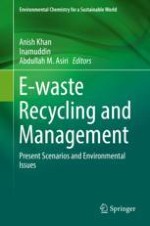2020 | OriginalPaper | Buchkapitel
3. An Economic Assessment of Present and Future Electronic-Waste Streams: Japan’s Experience
verfasst von : Hitoshi Hayami, Masao Nakamura
Erschienen in: E-waste Recycling and Management
Aktivieren Sie unsere intelligente Suche, um passende Fachinhalte oder Patente zu finden.
Wählen Sie Textabschnitte aus um mit Künstlicher Intelligenz passenden Patente zu finden. powered by
Markieren Sie Textabschnitte, um KI-gestützt weitere passende Inhalte zu finden. powered by
